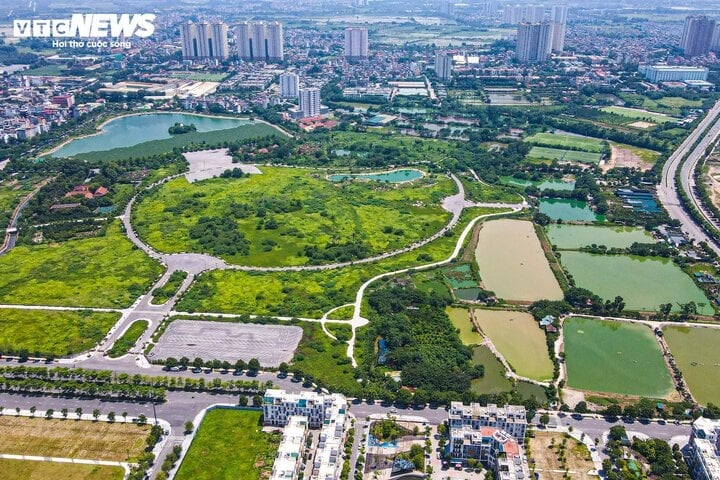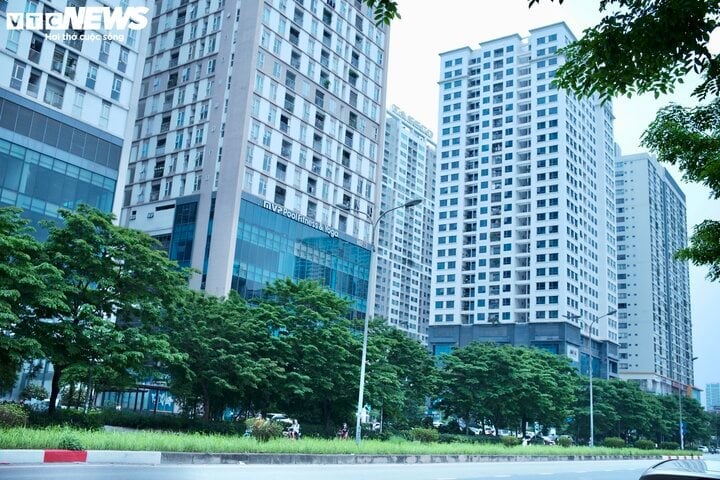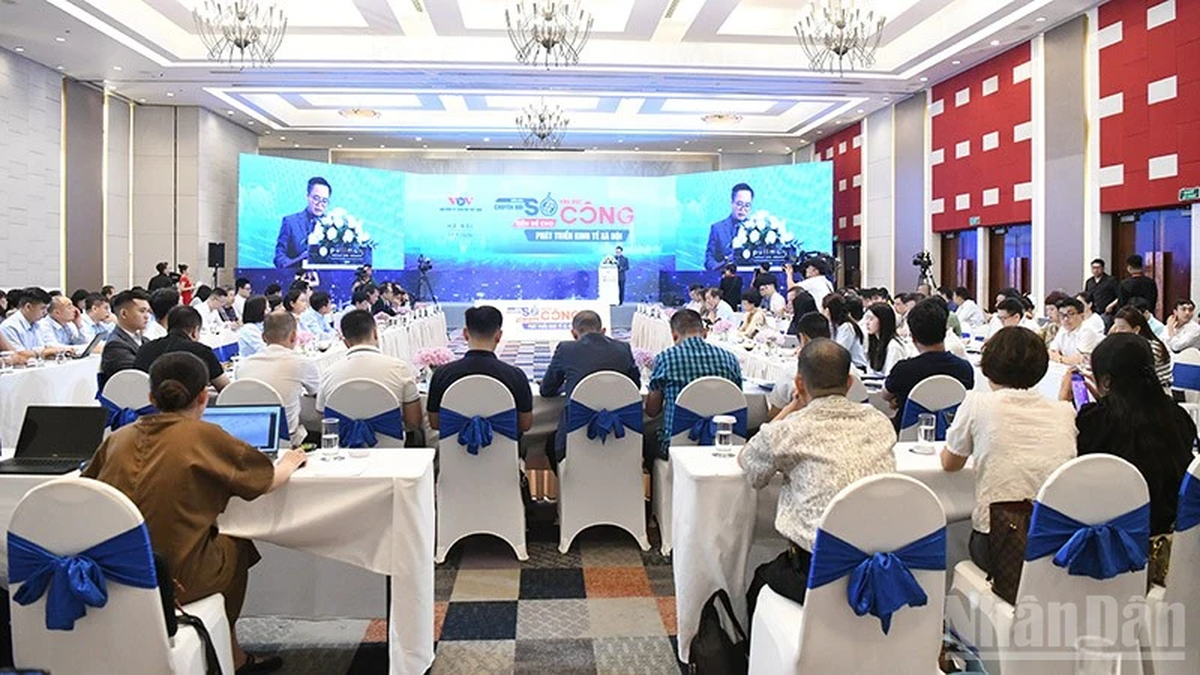The Land Law (amended) has just been passed at the 5th extraordinary session of the 15th National Assembly , consisting of 16 chapters and 260 articles with many new points compared to the 2013 Land Law.
Land price list updated annually
According to the provisions of the 2013 Land Law, the land price list is regulated every 5 years and must be adjusted and supplemented in case of fluctuations in market land prices.
However, in reality, there are very few cases where land price tables are adjusted during the application process, resulting in land price tables not accurately reflecting actual land prices on the market.
Therefore, the Land Law (amended) stipulates the issuance of annual land price lists to ensure close adherence to actual market developments and expand the scope of application of land price lists.

The Land Law (amended) has many new points. (Illustration photo)
The amended law also stipulates that the Provincial People's Committee is responsible for submitting to the People's Council for decision to adjust, amend and supplement the land price list for promulgation and application from January 1 of the following year or to adjust, amend and supplement within the year and assign the Government to stipulate details to ensure that the land price list will be updated in accordance with reality.
Agreement on land use rights to implement housing projects
One of the contents that has received many different opinions in the new Land Law is about the types of land used for commercial housing projects through agreements on receiving land use rights or having land use rights.
At Point b, Clause 1 and Clause 6, Article 127 of the Land Law recently passed by the National Assembly, it is stipulated: Commercial housing projects can be implemented through agreements on receiving land use rights for residential land; existing land use rights can be used to implement commercial housing projects for residential land or residential land and other land.
If necessary, the Government is requested to study and develop a pilot project to submit to competent authorities for submission to the National Assembly for consideration and issuance of a Resolution allowing the pilot implementation of commercial housing projects through agreements on receiving land use rights or having other land use rights as prescribed by Law.
Granting red books for land without papers without violating land laws
The Land Law (amended) specifically stipulates the issuance of Certificates of land use rights and ownership of assets attached to land for households and individuals using land without documents on land use rights without violating land laws and not in cases where land is allocated without proper authority.
Accordingly, households and individuals using land before December 18, 1980, and confirmed by the commune that there is no dispute, will be granted a Certificate of land use rights and ownership of assets attached to the land as follows:

These new policies will have a positive impact on the real estate market.
For land plots with houses, houses and works serving life, if the land plot area is equal to or larger than the residential land recognition limit as prescribed in Clause 5, Article 141 of this Law, the residential land area recognized is equal to the residential land recognition limit and no land use fee is required.
For land plots with houses, houses and works serving life, if the land plot area is smaller than the land recognition limit prescribed in Clause 5, Article 141 of this Law, the residential land area is determined to be the entire area of that land plot and no land use fee is required.
For land plots used for non- agricultural production, business, trade and service purposes, non-agricultural production and business land is recognized according to the actual area used; the form of land use is recognized as the form of land allocation with land use fee collection, the land use term is stable and long-term.
Specific regulations on land recovery for socio-economic development
Regarding land recovery, compensation and resettlement support, the revised Land Law has specifically stipulated cases where the State recovers land for socio-economic development for national and public interests.
The projects that the State recovers in this case must be projects: construction of public works; construction of headquarters of state agencies, public works; other cases, including many groups of criteria such as housing, production areas, land fund development, minerals, underground works and cases where the State recovers land for auction, bidding to increase budget revenue...
With 31 specific cases of the State reclaiming land for socio-economic development for national and public interests, it has basically covered the issue.
In addition, the law also specifically stipulates the order and procedures for land recovery for socio-economic development for the national and public interest with many new points, ensuring democracy, objectivity, fairness, publicity, transparency, timeliness and compliance with the provisions of law.
This is also for the common benefit of the community and for the sustainable, civilized and modern development of the community and locality; paying attention to social policy subjects and subjects directly involved in agricultural production.
Along with that are the steps to implement compensation, support, resettlement, and land recovery ensuring the principle of people's participation at all stages, ensuring the principle that people whose land is recovered are compensated and resettled before land recovery...
Cases of land allocation without auction bidding
Regarding land allocation, land lease, and permission to change land use purposes, the revised Land Law has specifically regulated cases of land allocation without auction or bidding and cases that must go through auction of land use rights, bidding to select investors to implement projects using land, and regulated cases of land lease with one-time payment for the entire lease term in accordance with the spirit of Resolution No. 18 of the Central Committee.
The Law has specifically stipulated the conditions and authority for permitting the change of land use purpose, in which the entire authority to approve the change of land use purpose for rice cultivation, protective forest land, special-use forest land, and production forest land that is natural forest is delegated to the People's Council at the provincial level.
In which, it is clearly stipulated that households and individuals who are using land and have the need to change the purpose of using agricultural land in residential areas, agricultural land in the same plot of land with residential land to residential land or change the purpose of using non-agricultural land that is not residential land to residential land, then based on the district-level land use planning approved by the competent authority to allow the change of land use purpose without basing on the annual district-level land use plan.
Land policy for ethnic minorities
Regarding land policy for ethnic minorities, this is also one of the contents that has been studied and supplemented to be included in the provisions of the revised Land Law. The passed law has stipulated policies to ensure land for community activities; land allocation and lease for ethnic minorities lacking residential land and production land; and ensuring land funds to implement land policies for ethnic minorities.
Chau Anh
Source





































































































Comment (0)